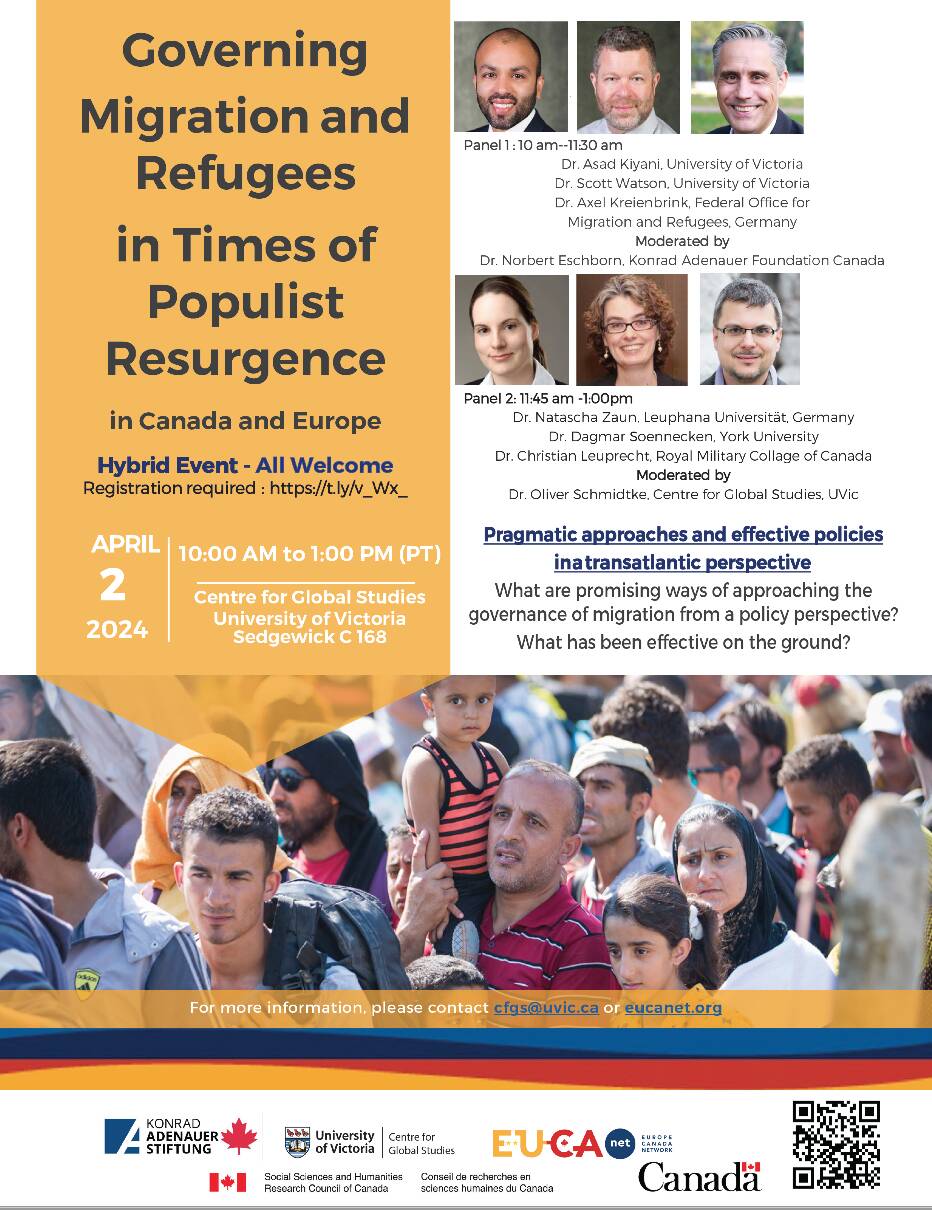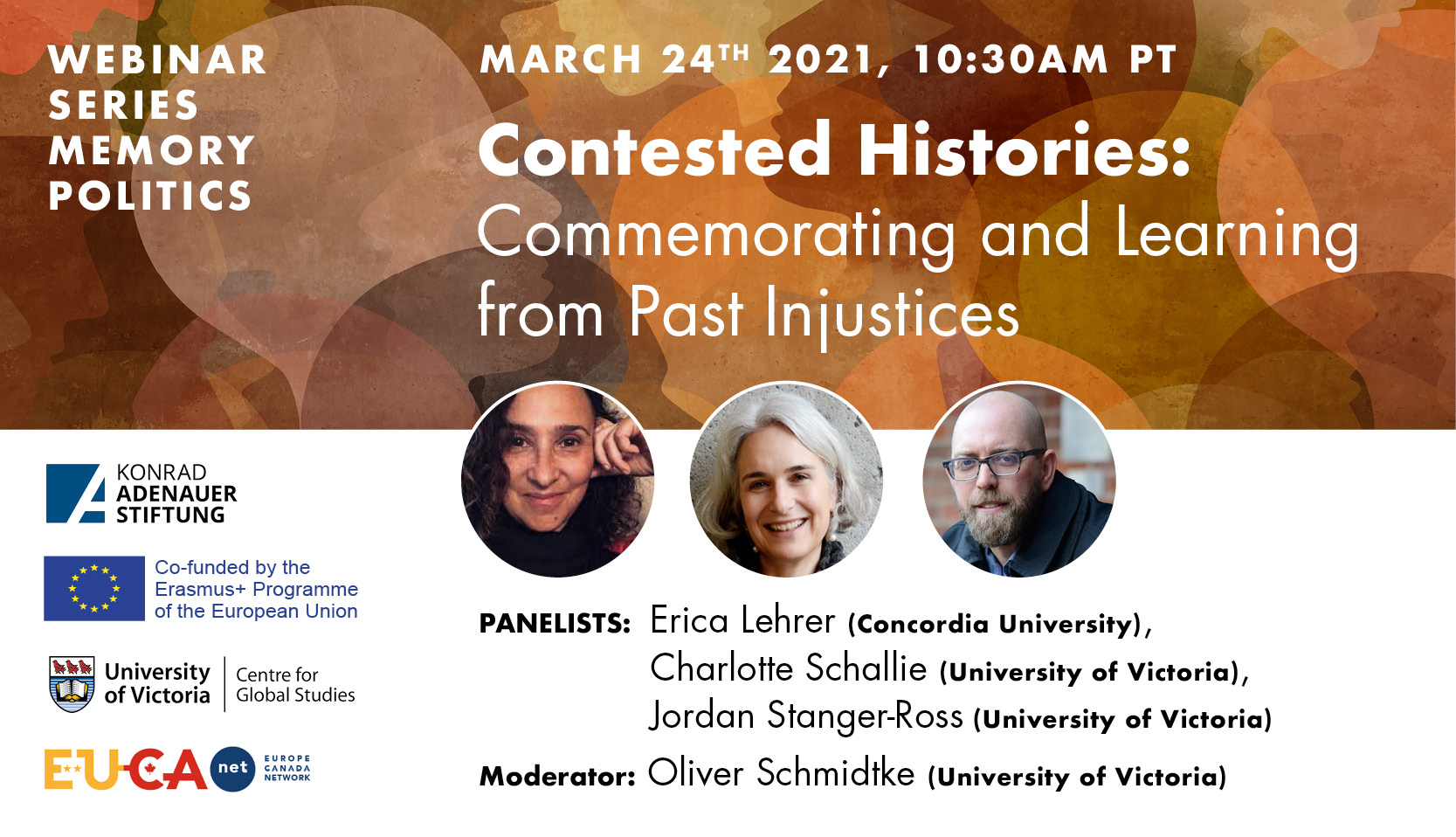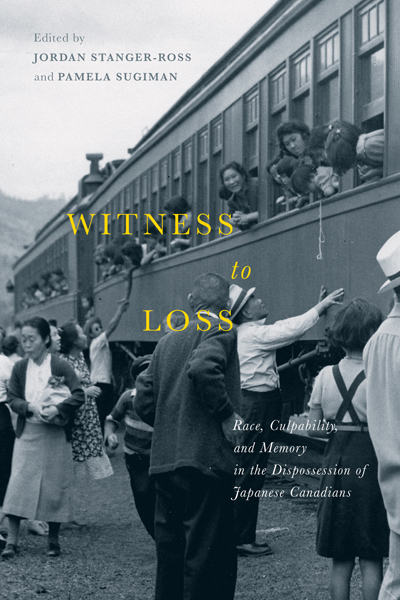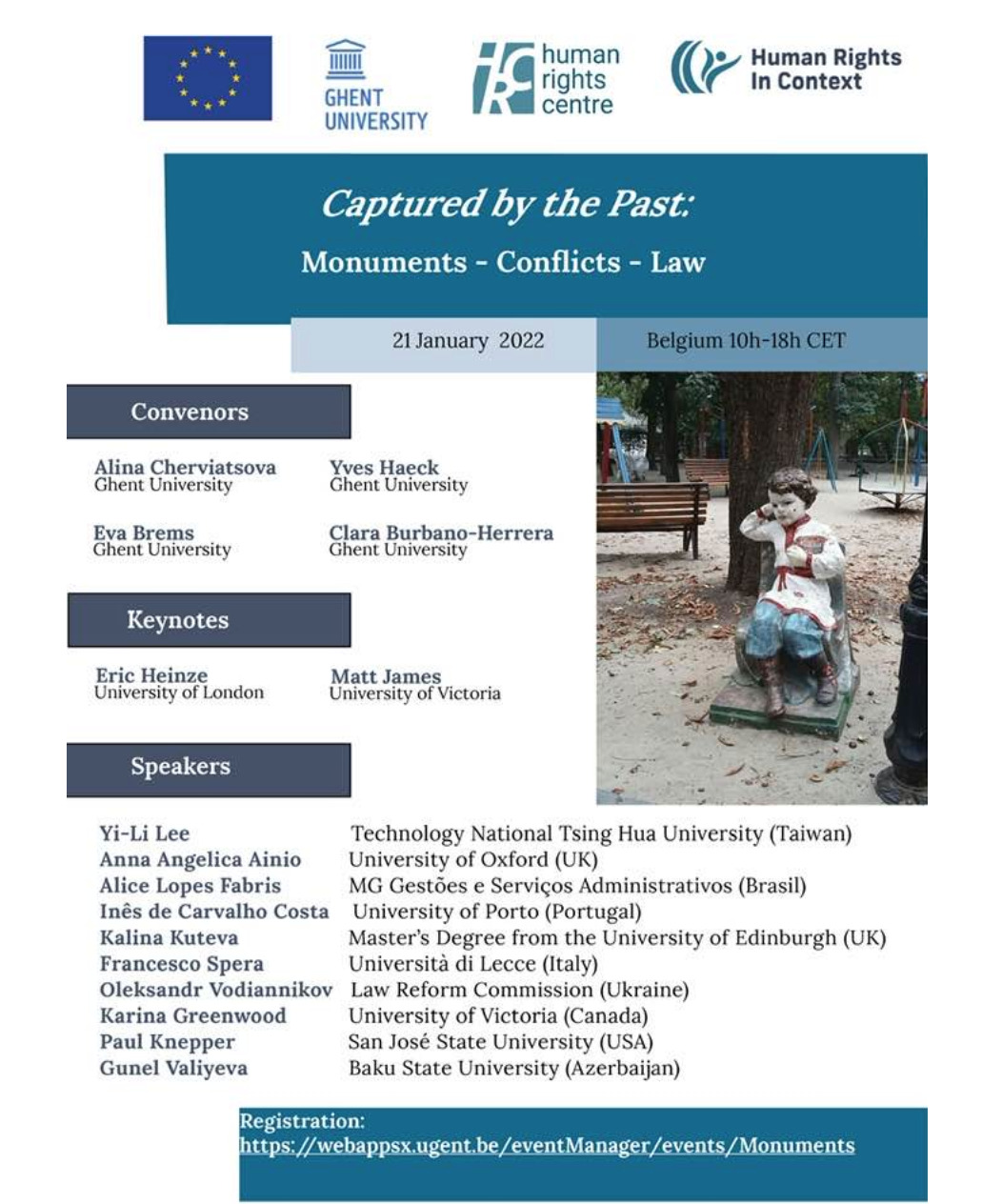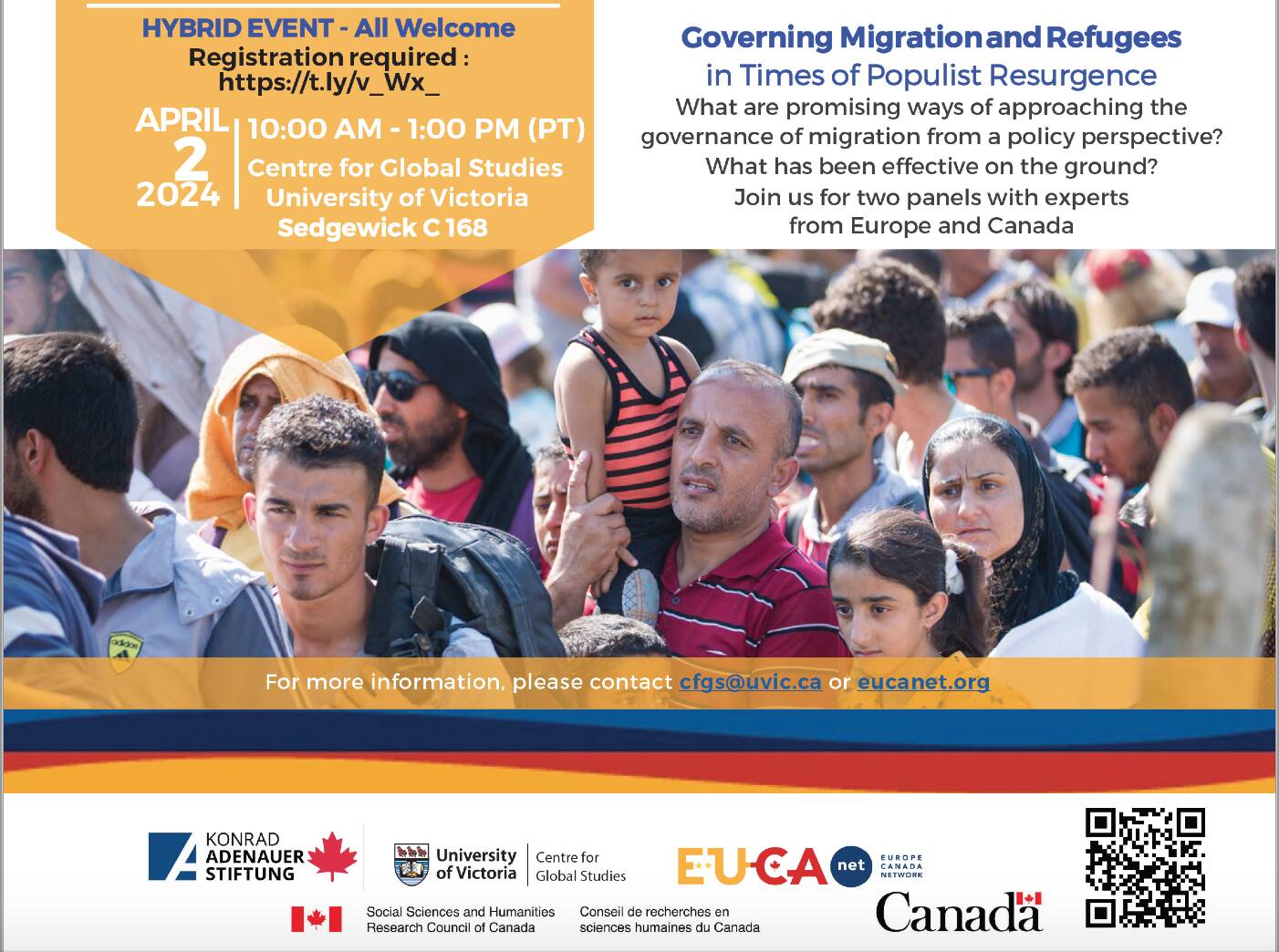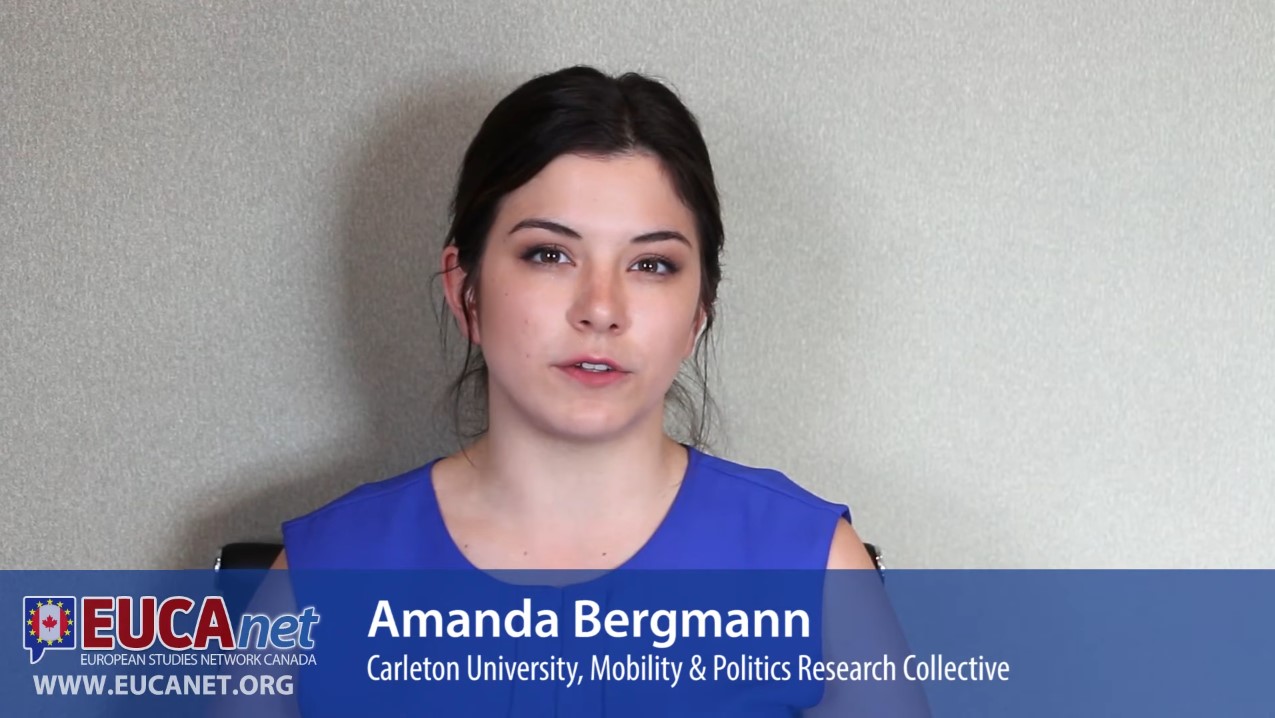Governing Migration and Refugees / Event Summary/ Video 2
Video Panel 2
Governing Migration and Refugees in Times of Populist Resurgence
in Canada and Europe
On April 2, 2024 the Centre for Global Studies (University of Victoria) hosted a hybrid event co-sponsored by the Konrad Adenauer Foundation (KAS) Canada. The presenters of the two panels of the event addressed the following questions:
What are promising ways of approaching this politically thorny issue from a policy perspective?
What has worked, which approaches have proven to be effective and suitable/desirable in terms of their outcome on the ground?
The second panel was moderated by Dr. Oliver Schmidtke (University of Victoria)
Dr. Natasha Zaun’s presentation tackled the EU Asylum policies and the Common European Asylum System. Zaun began her presentation by outlining the historical development of the EU Asylum Law from the early 1990s. She noted that the EU Asylum policies were initially designed as redistributive policies, following the disintegration of the Soviet Union and the subsequent Wars in former Yugoslavia, and that they tried to address the unequal distribution of asylum seekers by harmonizing asylum policies. In this context, the Dublin convention – which later became the Dublin Regulations – introduced the first country of entry principle with the purpose of increasing the responsibility of border countries in the management of asylum seekers. Therefore, the first and second phases of the Common European Asylum System during the 2000s and until 2012 aimed at implementing harmonization policies and avoiding secondary movements of asylum seekers.
Dr. Zaun continued by explaining how the European Asylum System was politicized after the 2015 ‘refugee crisis’ and how European countries put forward different demands based on their geographical collocation. In this context, in several EU countries, anti-immigrant populist parties formed governments that blocked the EU’s attempts to reform its asylum policies. According to Zaun’s research, this was done for political reasons, to prove the EU’s weakness and its incompetence in tackling the ‘refugee crisis’. This was promoted through a narrative constructed by the populist anti-immigrant parties and fostered by the media, as shown by the 2018 ‘disembarkation crisis’ in Italy, whose government at that time was led by the Lega party, and used this narrative to mobilize its voters. Zaun concluded her presentation by stressing that in the period following the 2015 crisis the EU’s governance of asylum changed in the direction of increasing the EU’s capacity building and the EU’s sovereignty on this matter. The powers gained by Frontex, the strengthening of the European border policies and the The European Union Agency for Asylum created in 2021 indicate a development in this direction.
The second panelist of the session, Dr. Christian Leuprecht followed up by outlining some of the main challenges of the 21st century in regulating mobility regimes across borders. He noted that the institutions governing transnational flows are static and obsolete and they are not able to capture the mobility characterizing our century. Leuprecht emphasized that today, non-state actors and climate change are leading causes of much of the flows of people and state actors have relatively limited control on these factors. At the same time, the ease of transportation has expanded the number of destinations available.
Dr. Leuprecht continued by explaining that these migratory patterns are going to be a permanent feature of our planet, especially when considering that the world’s population will increase by half a billion in 40 years and that most of those people will be born in places that are climatewise and economically unsustainable. To avoid that these patterns jeopardize the democracy and the prosperity of the Western societies – said Leuprecht – it is important to find ways to disentangle issues of criminality from humanitarian entitlements and humanitarian law.
The scholar also pointed at different countries’ basic social contract that determines the different ways in which they approach migration. He also emphasized the dangerousness of using the term ‘migrant’ as an ubiquitous term, which risks considering all the people crossing borders in the same light, without taking into account the specific moral and legal obligations that states have towards different types of people. This, according to Leuprecht, is part of the problem and one of the underlying causes of the break of the governance systems of Western societies.
The 2015 crisis showed how this break can play out and become a weapon in the hands of autocratic regimes like Putin’s Russia. The Russian government’s increased influence in African countries such as Burkina Faso, Mali and the Central African Republic will foster instability and generate new migratory flows which, in turn, will cause a populist backlash and resentment. In this sense, concluded Leuprecht, what happens in the foreign policy sphere cannot be considered as separate from the sphere of regional stability or instability as it has direct consequences for border regimes.
Dr. Dagmar Soennecken concluded the second panel sharing some results of a recent research conducted on the specific needs of vulnerable migrants in various contexts. The focus of Dr. Soennecken’s presentation was the resettlement stream and its application in comparative perspective through the cases of Canada and Norway in particular. As explained by the scholar, resettlement is defined as the selection of migrants overseas according to criteria
that prioritize people who are considered most vulnerable and for whom there is no alternative durable solution. Dr. Soennecken stressed that this type of stream is often preferred by states in the global North because it is discretionary, as it allows them to choose the people to accept. It is a humanitarian process with no legal obligation and it is also highly symbolic, because it focuses on particular groups that are ‘worthy of coming’.
The scholar noted that only 1% of the people that are currently displaced get resettled through this process. There are intrinsic governance problems at the EU level that makes it hard to persuade countries to take migrants – but there are also countries such a s Sweden, or others outside the EU such as Norway, Canada or the United States that participated in resettlement. In Canada the so-called private resettlement stream (or the community-based resettlement stream) is the most popular option in the resettlement stream as it has been more successful in integrating the people that were resettled. The people that are selected for the stream often have connections in Canada, they have better language skills and educational credentials. This means that the original promise of taking the most ‘vulnerable’, but those who have a better chance of integrating in the job market. Dr. Soennecken further explained that Norway has traditionally had a government resettlement stream and that is currently exploring a community resettlement stream. Community-based programs are at an experimental stage across the European Union, but they are still very limited.
Soennecken also noted that the issue has often been politicized. For governments, it is politically more important ‘who’ they resettle, rather than the number of the people that they resettle. The data from a recent research confirm this trend, showing an important decrease in the number of humanitarian arrivals over the last 40 years. Moreover, in recent years, the governments in Norway and in Canada have tried to add to the vulnerable groups indicated by the UNHCR other groups, like religious groups, but they limited these to Christians and non-Muslim minorities, while excluding Muslim groups.
About the authors:
Natascha Zaun (University of Lüneburg, Germany) is a professor in Public policy and Law. She previously worked as associate professor in Migration Studies at the European Institute at the London School of Economics and Political Science and as a research fellow in Global Refugee Policies at the Refugee Study Center at the University of Oxford. She is an expert on European and global refugee, immigration and border policies and politics. She specialized in EU politics and public policy as well as international cooperation with a particular focus on refugee migration. Dr. Zaun holds a PhD in political science from the University of Bremen (Germany). Her work has been published in journals such as the Journal of European Public Policy, the Journal of Common Market Studies, West European Politics and the Journal of Ethnic and Migration Studies.
Christian Leuprecht (Royal Military College) is a Professor in Leadership, Department of Political Science and Economics, and Eisenhower Fellow at the NATO Defence College in Rome. He is cross-appointed, Department of Political Studies and the School of Policy Studies, Queen’s University, where he is affiliated with both, the Queen’s Centre for International and Defence Policy and the Institute of Intergovernmental Relations, and Adjunct Research Professor, Australian Graduate School of Policing and Security, Charles Sturt University as well as the Centre for Crime Policy and Research, Flinders University. He is a recipient of RMC’s Cowan Prize for Excellence in Research and an elected member of the College of New Scholars of the Royal Society of Canada, he is also Munk Senior Fellow in Security and Defence at the Macdonald Laurier Institute. An expert in security and defence, political demography, comparative federalism, and multilevel governance, he has held visiting positions in North America, Europe, and Australia, and is regularly called as an expert witness to testify before committees of Parliament. He holds appointments to the board of two new research institutes
Dr. Dagmar Soennecken (York University) is cross-appointed between the School of Public Policy and Administration (SPPA) and the Law and Society Program (Department of Social Science). From 2016 to 2020, she served as the academic director of the Master in Public Policy, Administration and Law (MPPAL) program. In 2019, she became the Editor-in-chief of Refuge: Canada’s Journal on Refugees, one of the oldest academic, peer-reviewed journals on forced migration. Soennecken holds a Ph.D. (2009) from the University of Toronto. She has twice been a Visiting Scholar at the Centre for European and International Aliens and Asylum Law at the University of Konstanz, Germany. For the 2006/07 academic year, she was a Visiting Study Fellow at the University of Oxford’s Refugee Studies Centre (RSC). In the summer of 2013 and 2015, she held the Canadian Guest Professorship at the University of Kiel, Germany. She has been a recurring visiting scholar at the Migration and Integration Studies Centre (IMIS) and at the Jean Monnet Centre for Excellence (JMCE) in European Studies at the University of Osnabrück, Germany.
